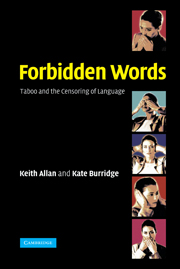Book contents
- Frontmatter
- Contents
- List of figures
- Acknowledgements
- 1 Taboos and their origins
- 2 Sweet talking and offensive language
- 3 Bad language? Jargon, slang, swearing and insult
- 4 The language of political correctness
- 5 Linguistic purism and verbal hygiene
- 6 Taboo, naming and addressing
- 7 Sex and bodily effluvia
- 8 Food and smell
- 9 Disease, death and killing
- 10 Taboo, censoring and the human brain
- Notes
- References
- Index
10 - Taboo, censoring and the human brain
Published online by Cambridge University Press: 03 December 2009
- Frontmatter
- Contents
- List of figures
- Acknowledgements
- 1 Taboos and their origins
- 2 Sweet talking and offensive language
- 3 Bad language? Jargon, slang, swearing and insult
- 4 The language of political correctness
- 5 Linguistic purism and verbal hygiene
- 6 Taboo, naming and addressing
- 7 Sex and bodily effluvia
- 8 Food and smell
- 9 Disease, death and killing
- 10 Taboo, censoring and the human brain
- Notes
- References
- Index
Summary
Forbidden words are the most emotionally evocative of all language stimuli. Research in psychology, physiology and neurology corroborate that they are processed differently from ordinary language and are subject to more acute recognition and recall. Taboo language has a special place in our neural anatomy. Before reviewing the evidence for these claims, we look back at what has been said about taboo and censoring.
Revisiting taboo, censoring and X-phemism
The word taboo refers to forbidden behaviour, and tabooed behaviour is subject to censoring. We have discussed constraints on the use of jargon, slang, swearing and insult; censoring the way we talk about people who may be perceived or perceive themselves to be disadvantaged or oppressed; notions about correct and incorrect grammar; taboos on naming and addressing people and dangerous animals; injunctions on speaking about the organs of sex, micturition and defecation, their functions and effluvia; censoring the language for foods, and language dealing with diseases, death and killing. The most serious taboos apply to things thought to be ominous, evil or offensive to supernatural powers; to violate such taboos automatically causes harm (even death) to the violator and perhaps his/her fellows. In this context, euphemism can be quite literally a matter of life or death. However, taboos do not always risk physical or metaphysical injury; Old Polynesia had taboos on bad manners such as readers of this book may experience in their everyday lives – taboos that are merely social sanctions placed on behaviour that is regarded as distasteful or impolite within a certain social context.
- Type
- Chapter
- Information
- Forbidden WordsTaboo and the Censoring of Language, pp. 237 - 253Publisher: Cambridge University PressPrint publication year: 2006



